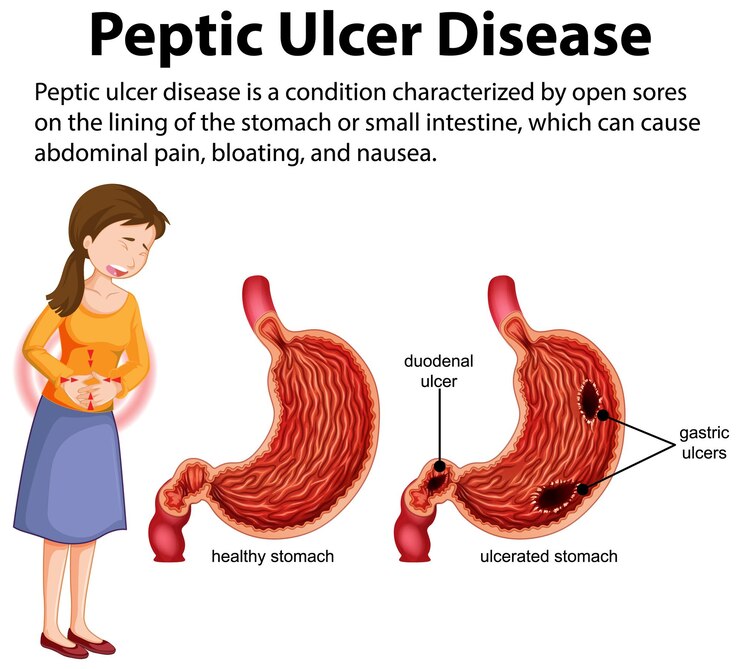Peptic ulcer disease (PUD) is a condition characterized by painful sores or ulcers in the lining of the stomach or the first part of the small intestine, called the duodenum. While factors like excessive use of nonsteroidal anti-inflammatory drugs (NSAIDs) or excessive stomach acid secretion were previously thought to be the main causes, it’s now known that the majority of peptic ulcers are caused by a bacterial infection, specifically by a bacterium called Helicobacter pylori (H. pylori).
Here are some details about bacterial infection and peptic ulcer disease:

Helicobacter pylori (H. pylori): This bacterium infects the lining of the stomach and the duodenum, weakening the protective mucous coating of the stomach and allowing stomach acid to cause irritation and ulcers. It’s estimated that around 70-90% of peptic ulcers are associated with H. pylori infection.
Transmission: The exact method of transmission is not fully understood, but it’s believed that H. pylori is transmitted through oral-to-oral or fecal-to-oral routes. Factors such as poor sanitation, crowded living conditions, and contaminated food or water may contribute to its spread.
Symptoms: The symptoms of peptic ulcers can vary but often include abdominal pain, typically felt as a burning or gnawing pain between the breastbone and the navel. Other symptoms may include bloating, nausea, vomiting, and in severe cases, bleeding, which can lead to dark, tarry stools or vomiting blood.
Diagnosis: Doctors may perform tests to diagnose H. pylori infection and peptic ulcers, such as a breath test, stool test, blood test, or endoscopy, where a thin, flexible tube with a camera is used to examine the stomach and duodenum.
Treatment: The primary treatment for H. pylori-induced peptic ulcers involves a combination of antibiotics (to kill the bacteria) and acid-suppressing medications (to reduce stomach acid production). This treatment typically consists of a course of antibiotics like clarithromycin, amoxicillin, or metronidazole, along with proton pump inhibitors (PPIs) or H2-receptor antagonists.
Successfully treating the H. pylori infection often leads to the healing of peptic ulcers and significantly reduces the risk of recurrence. If you suspect you have peptic ulcer disease, it’s crucial to seek medical attention for proper diagnosis and treatment.
